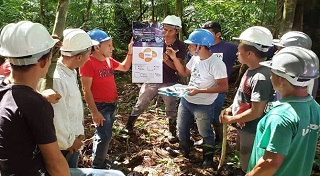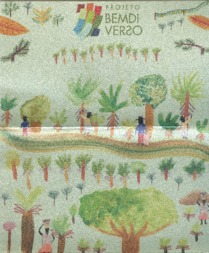UN features Bem Diverso Project
UN features Bem Diverso Project
Photo: Embrapa-Bem Diverso Photo/Archive

Training on minimal-impact management of native açaí palm groves, in Marajó, Pará
The United Nations (UN) announced that the Bem Diverso Project, led by Embrapa Genetic Resources and Biotechnology (Brasília, DF) in partnership with the United Nations Development Program (UNDP) has been selected in the Second Call for SDG Good Practices, Success Stories and Lessons Learned 2020/2021.
The activities developed by the corporation's researchers were highlighted because they contain a set of practices that encompass the problems local communities face in terms of production systems, processing and trade and of access to credit and public policy in six 'citizenship territories' in the biomes Amazonia (upper Acre river valley and Capixaba; and Marajó), Caatinga (São Francisco river backlands and Sobral) and Cerrado (middle Mearim river valley and upper Pardo river valley).
According to the researcher Anderson Sevilha, leader of Bem Diverso, the lines of action in the project address cultural, educational, health, clean energy, environmental, economic, and youth and gender inclusion issues. Hence each of the themes will be addressed with a cross-cutting approach to incorporate the Agenda 2030's Sustainable Development Goals (SDG) into the project.
Action in practice
According to Anderson Sevilha, they developed a series of socioeconomic and environmental diagnoses in every production chain related to integrating conservation and sustainable use of biodiversity into forestry and non-timber forest products (NTFP) production practices and multi-purpose Agroforestry systems (AFS) of high conservation value. They in turn made it possible not only to identify bottlenecks and opportunities, but also the definition of a project baseline to facilitate monitoring.
“The interesting thing is that all the activities occurred jointly with local communities, technicians, extension agents, researchers, professors, students and other beneficiaries; we built a training program in the project action lines: production systems, product processing, trade and access to credit and public policy. All the activities have been planned in order to obtain independence and replicability of local community actions, considering the knowledge of local communities and the validation of traditional practices in the capacity-building process”, Sevilha comments.
Another important aspect to be taken in consideration was access to the market, which was mapped along demands. The communities involved in the six "citizenship territories" also received a series of events of training on biodiversity conservation, management of species and ecosystems, and ecological rehabilitation to produce agrobiodiversity products with added environmental value.
Results presented to the UN

The outcomes presented by the leader of the Bem Diverso Project to compete in the Second Call for SDG Good Practices, Success Stories and Lessons Learned in the implementation of the Agenda 2030 (listed below) include an average reduction of 84% of wildfires centered in the territories and over 1 million hectares under sustainable management, which contributed to an average increase of 30% in yield and of 40% in family income.
“Moreover, we have obtained more than R$2 million in credit for the communities, developed four new products, four new pieces of equipment, 22 labels, and we improved six processed products”, Anderson Sevilha states.
- Installation of 72 learning units;
- Three reference centers and three networks of young popular communicators;
- Capacity-building involving over 3,000 people (43% women and 57% men);
- Mapping of nine production chains;
- Development of 10 studies on land use and sustainable exploitation levels;
- Development of three land management plans;
- Establishment of six contracts of use of land and water. These activities resulted in an average reduction of 84% of fire foci in the territories and 1 million hectares under sustainable management, which contributed to average increase of 30% in productivity and 40% in family income.
Impacts of COVID-19
As COVID-19 arrived in Brazil, the researchers interrupted their field trips in order to prevent the spread of the virus and considering that in the communities involved there are no hospitals or health facities. Then the contacts have remained long-distance, through digital means, so that the monitoring of project activities could continue during the pandemic. Another measure that was adopted as a means to prevent infections by the virus without leaving Bem Diverso participants without quality information regarding the steps to be taken to mitigate contamination in the production systems, product processing and trade was promoting different virtual training to address the subjects. And, finally, a training program online was established with material to support the project's line of action. “We have taken steps and promoted action so that the project beneficiaries had access to the Internet, in order to ensure fast pick-up post-pandemic”, Sevilha reports.
Check on the Café com Ciência podcast an interview with researcher Anderson Sevilha about the results that made Bem Diverso stand out among the +100 projects from several countries.
Click here to see more details about the data presented to the UN.
Deva Heberlê (MTb/RS 5297)
Embrapa Genetic Resources and Biotechnology
Press inquiries
Phone number: +55 61 32084559 (WhatsApp)
Translation: Mariana Medeiros (013044/DF)
General Secretariat
Further information on the topic
Citizen Attention Service (SAC)
www.embrapa.br/contact-us/sac/

